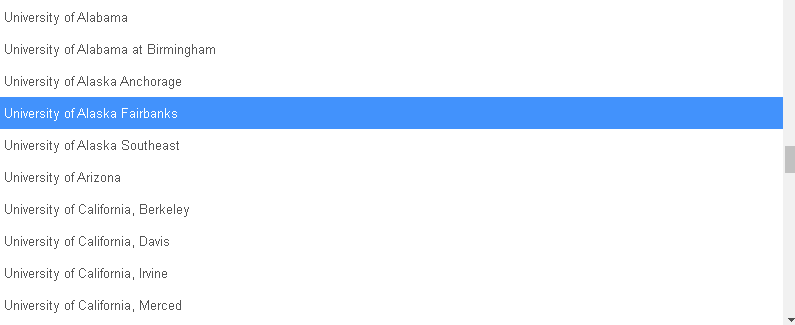Electronic Research Administration
Pivot Funding Opportunities Database
(i.e. Federal, State, Foundation, Private, Early Career, Postdoctoral, Papers Invited, Collaborators)
Pivot is a comprehensive global database of sponsored funding announcements and scholar profiles that is available to all University of Alaska faculty, staff and students. Pivot uses a powerful search engine to find funding opportunities and collaborators that match your profile and search queries.
What can Pivot do?
- Access the most comprehensive global database to search for funding opportunities from private, state, and federal sponsors.
- Find other researchers both within and outside of University of Alaska with similar expertise and interests for collaboration.
- Set up automatic searches and email notifications of funding opportunities specific to your search terms.
- Track and share funding opportunities.
UA Statewide with the support of each of the research leads on each of our campuses has initiated a 3-year contract with Pivot. UAA has been using Pivot for the past two years and we believe that it has provided a wealth of great opportunities for our PIs.
What is Pivot?
Pivot-RP provides access to the most comprehensive global source of funding opportunities, facilitating collaborator discovery, and offering insights and short-cuts to help research organizations win a larger share of available funding. Pivot-RP unifies the Pivot® and Research Professional funding solutions, together serving hundreds of the world’s leading research institutions.
Pivot-RP has a number of online resources including a quick search for questions, brief YouTube videos, and user FAQs available from the “Help” button located on all Pivot-RP site pages. Below are links to instructional videos.
- Click here to view and print the Quick Start Guide PDF
- Getting Started with Pivot-RP
- Pivot Funding: Advanced Search
- Navigating Pivot Funding Results
- Tracking, Saving, Sharing & Managing Funding Opportunities
- Updating Your Pivot Profile
- All Pivot YouTube Instructional Videos
Creating an Account
Faculty can join and begin to search for opportunities by registering for an account.
To make an account direct your browser to https://pivot.proquest.com then click on Create Account that is found just below the other two login buttons.
On the next page click on “Use Email Address/Create Password”:

And then complete the form and select the correct institution from the Affiliated Member Institution list:

You must use your alaska.edu email and will receive a verification email once they set up the account. Once they verify the account, you should be good to go.
Pivot Use Case
(1) Pivot will allow each faculty to create a personal profile. This will allow pivot to automatically identify potential opportunities as well as when an opportunity is found, help identify potential collaborators within UA and external Pivot subscribers (think social networking of science). Faculty are not encouraged to create a profile from scratch, Pivot will be using webcrawlers to build the frames of these for our faculty in the coming weeks.
(2) Pivot will allow us to post our own internal opportunities, such as stale foundation funds, special internal calls, etc. This will provide us a better tool to manage these internal funds.
(3) Pivot will allow us to create lower-tier admins to assist in developing curated opportunity lists. Those that gravitate toward using Pivot can work with their campus admins to create curated lists, searches, and automatic newsletters (emails with compiled opportunities) to be distributed to subsets of our faculty.
(4) Better management of limited submissions through monitoring faculty tracking and anticipated applications. As three individual institutions, there are often instances where one institution has more interested in a limited submission than we have application slots. Using Pivot we can anticipate this and hopefully encourage proposal adaptation to utilize our broad system submission capacity through collaboration.
Federal eRA Portals
- Grants.gov
- NIH Commons
- NASA NSPIRES
- NOAA Grants Online
- Research.gov
- USDA ezFedGrants
- Open Researcher and Contributor Identifier (ORCID)
ORCID provides a persistent digital identifier that distinguishes you from every other researcher and, through integration in key research workflows such as manuscript and grant submission, supports automated linkages between you and your professional activities ensuring that your work is recognized.
ORCID Step-by-Step Instructions
Science Experts Network Curriculum Vitae (SciENcv) is an electronic system that helps researchers assemble the professional information needed for participation in federally funded research. SciENcv gathers and compiles information on expertise, employment, education and professional accomplishments. Researchers can use SciENcv to create and maintain biosketches that are submitted with grant applications and annual reports. SciENcv allows researchers to describe and highlight their scientific contributions in their own words.
SciENcv Step-by-Step Instructions

